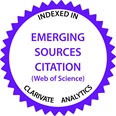Tytuł
Koncepcja Chance Management w koopetycji instytucji kultury
Keywords
coopetition, chance management concept, cultural institutions, museums, qualitative research
Słowa kluczowe
koopetycja,koncepcja chance management,instytucje kultury,muzea,badania jakościowe
Abstract
Purpose: The aim of the article is to exemplify the chance management concept in coopetition among cultural institutions and determine specific chance attributes. Design/methodology/approach: The empirical research was exploratory, and the research process used a qualitative, interpretative approach. The study used semi-structured, in-depth individual face-to-face interviews. A total of 42 interviews were conducted with public and private museums. Findings: Our research revealed that cultural entities take advantage of opportunities so as to achieve not only a competitive advantage, but also a cooperative, or even – as has been shown – a coopetitive one. Coopetition, in turn, can be analyzed through the lens of the chance management concept, and especially the relational perspective of chance, which views chance as an important element within an organization’s environment. Moreover, the specificity of coopetition in cultural institutions has shown the importance of social factors, emphasizing that coopetition is the effect of social construction, individual actions and the motivations of managers. Therefore, the social embeddedness of coopetition should be emphasized in this approach, determining not only the intentional, but also the emergent, nature of coopetition. At the same time, it reveals that the individual cognitive perspective of managers who are able to notice, use or create chance is significant. Originality/value: In strategic management, coopetition has been considered so far to be a planned, long-term phenomenon and a purposefully, deliberately created relationship. The findings of our research in the cultural sector have revealed that coopetition can also be a temporal, ad hoc relationship that is short-term in nature, as well as being incremental and undertaken spontaneously depending on emerging opportunities.
Abstrakt
Cel: celem artykułu jest egzemplifikacja koncepcji chance management w koopetycji instytucji kultury wraz z określeniem specyficznych atrybutów okazji. Metodologia: badania empiryczne mają charakter eksploracyjny, a proces badawczy opiera się na podejściu jakościowym interpretatywnym. W badaniu wykorzystano półstrukturyzowane, pogłębione indywidualne wywiady bezpośrednie. Przeprowadzono łącznie 42 wywiady wśród muzeów publicznych i prywatnych. Wyniki: przeprowadzone badania ujawniły, że instytucje kultury wykorzystują okazje, by osiągnąć przewagę nie tylko konkurencyjną, lecz także kooperacyjną, a nawet – jak wykazano – koopetycyjną. Z kolei koopetycję można rozpatrywać przez pryzmat koncepcji chance management, w szczególności relacyjnej perspektywy okazji, która ujmuje okazję jako ważny element otoczenia organizacji. Ponadto, specyfika koopetycji w instytucjach kultury ukazała znaczenie czynników społecznych, wskazując, że koopetycja jest efektem konstrukcji społecznej, indywidualnych działań oraz motywacji menedżerów. Dlatego też podkreślić należy zakorzenienie społeczne koopetycji, determinujące zarówno jej intencjonalny, jak i emergentny charakter. Jednocześnie, badania ujawniły jak ważna jest indywidualna perspektywa poznawcza menedżerów potrafiących dostrzec, wykorzystać lub stworzyć okazję. Oryginalność/wartość: koopetycja rozpatrywana była dotychczas w zarządzaniu strategicznym jako zaplanowane i długoterminowe zjawisko o świadomym i celowym charakterze. Badania w sektorze kultury ujawniły natomiast, iż relacja koopetycji może mieć także charakter czasowy, doraźny, krótkoterminowy, będący działaniem inkrementalnym, podejmowanym spontanicznie, zależnie od pojawiających się okazji.
Acknowledgments
The editing of this article was financed under Agreement No. RCN/SP/0316/2021/1 with funds from the Ministry of Science and Higher Education allocated to the ‘Rozwój czasopism naukowych’ programme.
Recommended Citation
Juszczyk, P., & Wójcik, D. (2023). The Concept of Chance Management in Coopetition Among Cultural Institutions. European Management Studies, 21(2), 25-50. https://doi.org/10.7172/2956-7602.100.2
First Page
25
Last Page
50
Page Count
25
DOI
10.7172/2956-7602.100.2
Publisher
University of Warsaw







